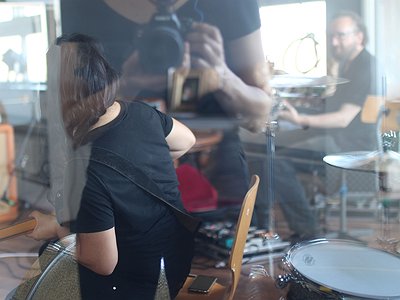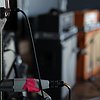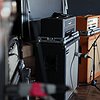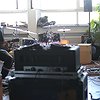Name: thisquietarmy (aka Eric Quach), N (aka Hellmut Neidhardt)
Occupation: Composers, improvisers, sound artists, guitarists
Nationality: Canadian (thisquietarmy), German (N)
Current release: thisquietarmy and N's Zerstoeren is out as a beautiful cassette tape via Midira. It contains compositions based on the same source material by Dirk Serries, Tom Malmendier, The Star Pillow, S A R R A M, Aidan Baker, and the Hypnodrone Ensemble.
If you enjoyed this interview with thisquietarmy and N, visit their respective websites for more information and current updates: thisquietarmy; N.
Where does the impulse to create something come from for you? What role do often-quoted sources of inspiration like dreams, other forms of art, personal relationships, politics etc play?
Eric: For me, I've always been a creative person, in the sense that I feel that the world is a blank canvas. And rather than just observe what is going on out there and be passive about it, there should be a reaction to everything that surrounds you, that you experience, that you share.
In my case, these reactions somehow need to come out as a form of expression resulting in a creation. Whether that creation is spontaneous or not, in the form of sound, visuals or even a technological invention, that is each and everyone's personal choice.
N: I can only agree with what Eric already said. I just need my tools (amps + guitar) and then I can start to explore …
The small difference is that in addition, I have my personal place – sound connection: All of my solo-recordings plus some of the collaborations are named after a real place and somehow deal with it. Sometimes I knew the place before and had it in mind when working on the music, sometimes the other way round. Not that I could tell before, how the place sounds … It is done if it feels right.
For you to get started, do there need to be concrete ideas – or what some have called a 'visualisation' of the finished work? What does the balance between planning and chance look like for you?
Eric: I think this concept of visualisation of the finished work before any work has even started is dangerous. At the very least, it should be flexible and open to change, without being constricted to the ultimate ideal of what you want it to be.
But yes, generally speaking, there should be an idea at first, and then this idea metamorphoses as you go forward. For this record, we did talk about wanting to do something very industrial-drone like vibes, especially and particularly to be inspired by the surroundings of the studio we recorded, located in the industrial park of Duisburg.
N: Indeed, this special surrounding was definitely part of the inspiration. But after starting to work, it is always better to let loose of self-made boundaries a bit to give the music the possibility to evolve. Also, because the chain of instruments (guitar > FX > amps) gains some kind of life of its own during playing, which can lead you to terrains you did not think about before.
Is there a preparation phase for your process? Do you require your tools to be laid out in a particular way, for example, do you need to do 'research' or create 'early versions'?
Eric: In the case of our collaboration, we mostly used the guitars and the pedals that we normally use. Because Hellmut normally uses two amps, in this case, I also used two amps as well to match him and try to play his game at his level. No research nor early versions, just straight up improvisational jams until it ends somewhere, a lot of experimentation and reactions to each other's sounds.
N: Right, that is how we made it. I also brought some pedals with me that are not on my current board, but mostly just used what I normally use. The most important thing was to listen to the parts Eric created and to react plus vice versa. If you are used to play solo, the task is to give room for your collaboration partner.
Do you have certain rituals to get you into the right mindset for creating? What role do certain foods or stimulants like coffee, lighting, scents, exercise or reading poetry play?
Eric: No, but Dimi ordered some pizzas and it helped a lot.
N: To be honest, we did not start with pizza. Wasn’t it coffee? But to be more sincere: If I switch on the amps and hear the hum, I am in.
Eric: Haha, well we started by taking our gear up 4 floors, so this counts as exercise.
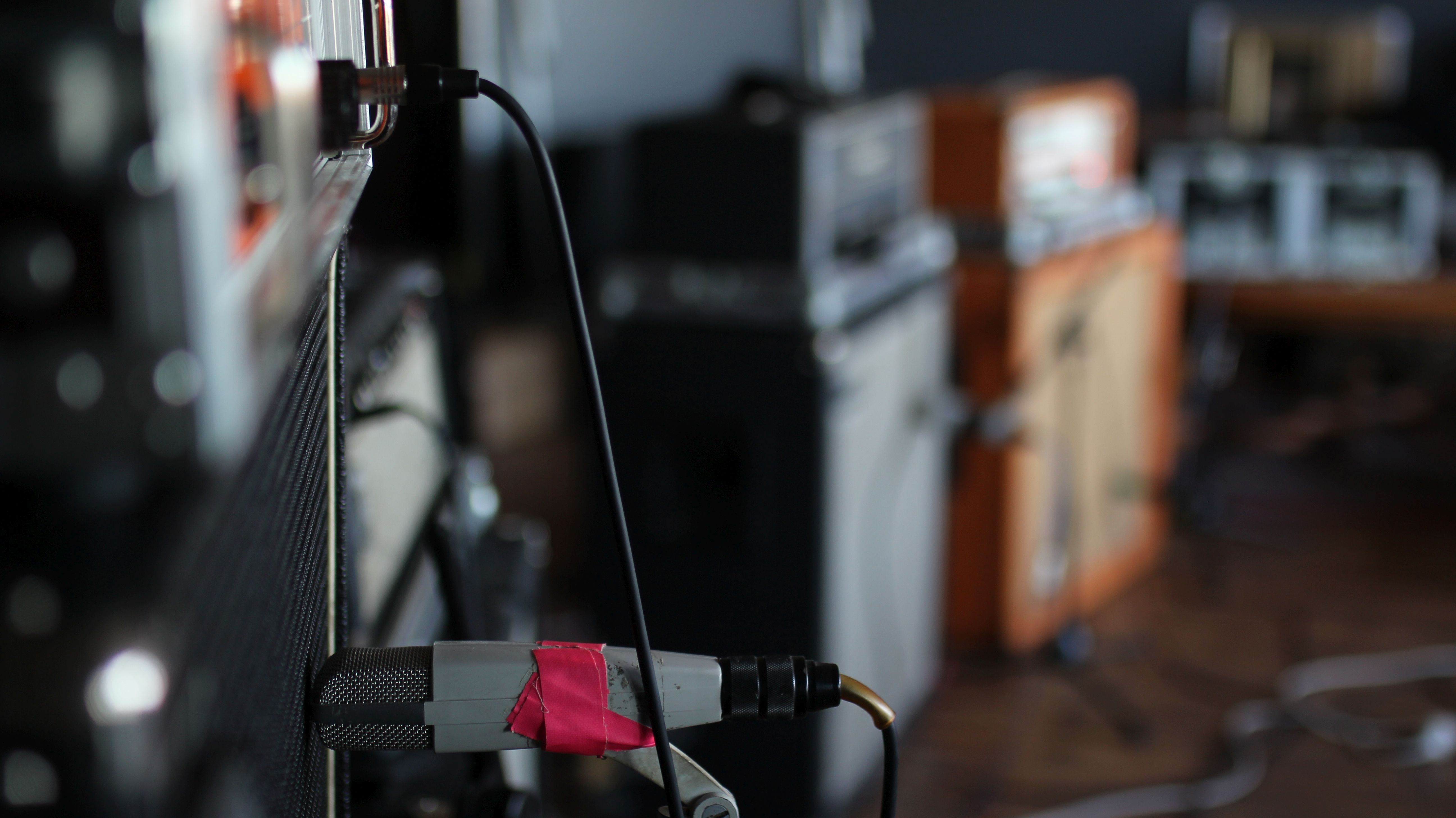
What do you start with? How difficult is that first line of text, the first note?
Eric: There are many options and you pick one and run with it.
N: It is good to start with something that does not give you the feeling you already did that a hundred times before. That might be a chord you do not use that often, that might be a special sound. And in case of a collaboration like ours it is (at least for me) easy, since there is someone else on board. And you simply don’t know what will happen from that side.
Eric: I'm usually tuned in C and Hellmut was in B, for some tracks I followed him in B and already it was a brand new starting point for me.
Why did I never really start a song in B before? It's strange because it is so close to C, but that is also the reason why.
Once you've started, how does the work gradually emerge?
Eric: You just go with the flow.
N: And you have to try to feel when the flow isn’t there and restart without boring yourself.
Many writers have claimed that as soon as they enter into the process, certain aspects of the narrative are out of their hands. Do you like to keep strict control over the process or is there a sense of following things where they lead you?
Eric: Controlling where art goes and where you want art to go can sometimes be counter-productive. Like I mentioned previously, it is dangerous to have a very fixed idea of what you want the end product to be. One of the main points of this collaboration, like many other collaborations, is that the results will be what the results will be.
And sure, we can then decide to add or subtract to it, mix it better, make it sound brighter or darker, clearer or muddier, shorter or longer... The real question is where does this infinity of possibilities end?
N: As I said before, in case of music like ours I always have the feeling that the chain of instruments is a bit out of control. But mostly in a good way, sending you somewhere else. Concerning the result it is better to get this going instead of trying to restrict it. At least mostly.
Eric: Out of control and chaos can definitely be a direction, a goal, an ambition, a tool.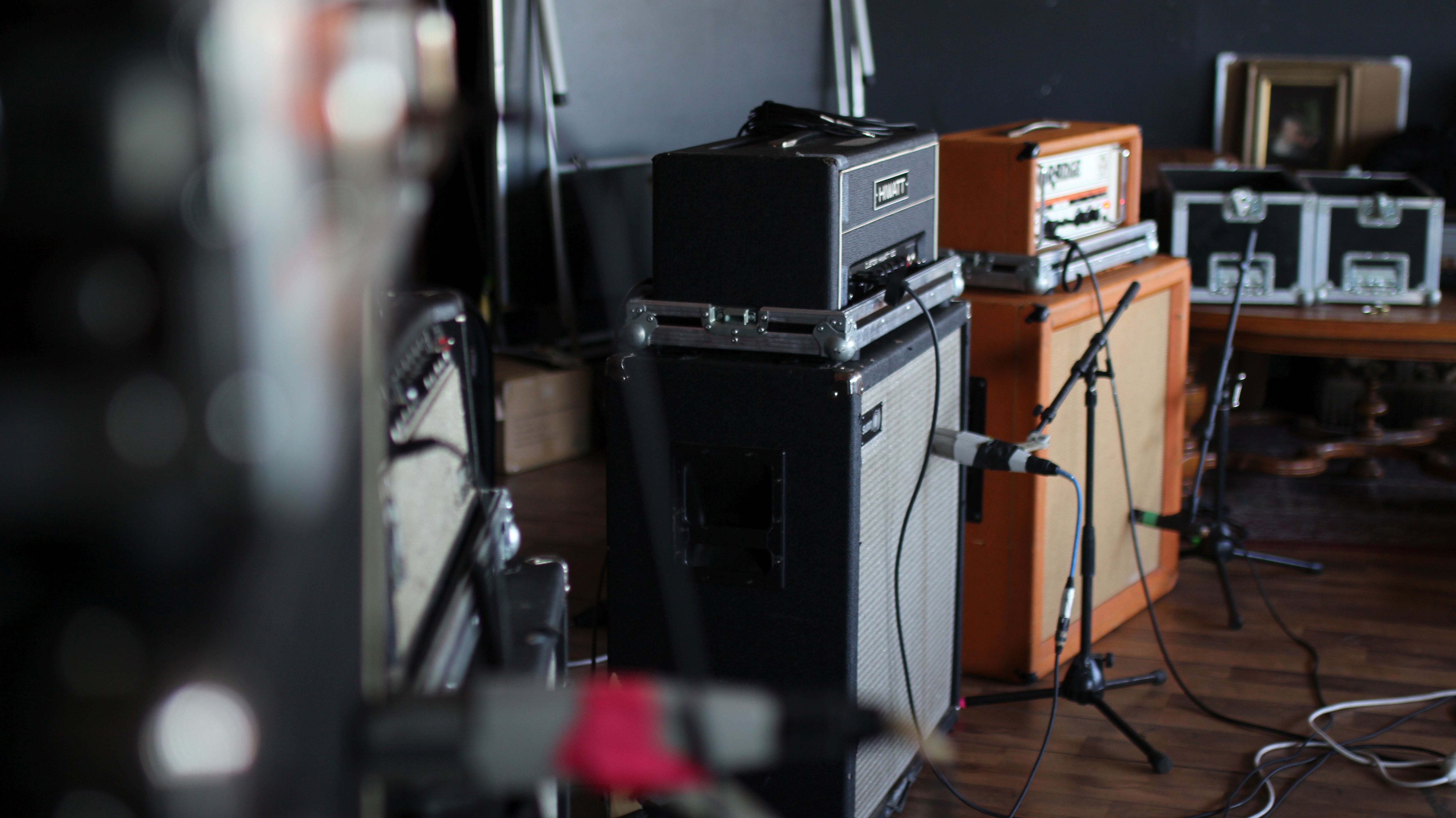
Often, while writing, new ideas and alternative roads will open themselves up, pulling and pushing the creator in a different direction. Does this happen to you, too, and how do you deal with it? What do you do with these ideas?
N: It happens a lot and normally I do not think about it when it happens but let it go instead. I can still start again later and try to go the path I intended. But speaking just about me: It is not seldom I think about a direction I want to follow before, but I end up somewhere completely different. And it is fine like this. So I rarely repeat a recording having in mind to go for the original idea then.
Eric: Definitely, I think a lot of great surprises come from new directions along the way, and you want to know where it will lead ... Stopping or interrupting the flow because it doesn't sound like you envisioned it is almost like a missed opportunity for a possible creative path you may never have thought of.
There are many descriptions of the creative state. How would you describe it for you personally? Is there an element of spirituality to what you do?
N: If I do not actually play, I think about what I may possibly play next time, maybe while driving a car. But if I start playing, I simply do not think. I just play. The sound itself leads me.
Eric: I mean, this whole spirituality thing - this ritual that we do, when we get lost into the playing, and we get into this state of being inside the soundwaves ... It does resemble something transcendental, levitating and out of this world. Sometimes it even feels like it's not us playing, or it's like getting out of our bodies and then watching us playing. But it's not really, it's still us, just on a subconscious level, in our own bubble, just focused in a very different wavelength than say, driving a car.
But yeah, we don't really think when we're in the zone. And great if people also get in that zone with us, or in their own way, also joining the ritual in any capacity whatsover. We play for ourselves and unpretentiously, but everyone is welcomed to join if they feel it too.
N: Absolutely agree!
Especially in the digital age, the writing and production process tends towards the infinite. What marks the end of the process? How do you finish a work?
Eric: Often with improvisations and with collaborations, you can simply choose to treat the work as a "document" of the encounter and just try to make it sound as best as possible, during the post-production. In other cases, you can also try to enhance the results with overdubs or adding different elements afterwards - which is actually what we did with the "Zerstoeren" piece.
This particular track seemed quite unfinished, and also stood out from the rest of the recordings because of the additions of drums by Tobias Stieler. So we had the idea of sending the unfinished track to friends so we could have different versions, completed by them and also by Helmut and I, separately. In the end, we ended up with very different tracks stemming from this piece, and compiled them as a coda to the actual record.
N: I am the ‘first take’ guy. I do not like to repeat everything a hundred times nor to work on it for hours post-production wise. I just like to have it like it was in the moment of inspiration and thus just add some EQ afterwards to make it sound on the recording like it was in the studio in front of the amplifiers. In any way it is like this with my solo recordings, like an unwritten law.
With a collaboration or a project like [MULTER], in which I play also, it might be different. Or let’s say: If Eric would have mentioned the ‘need’ of more postproduction I would not have stopped him.
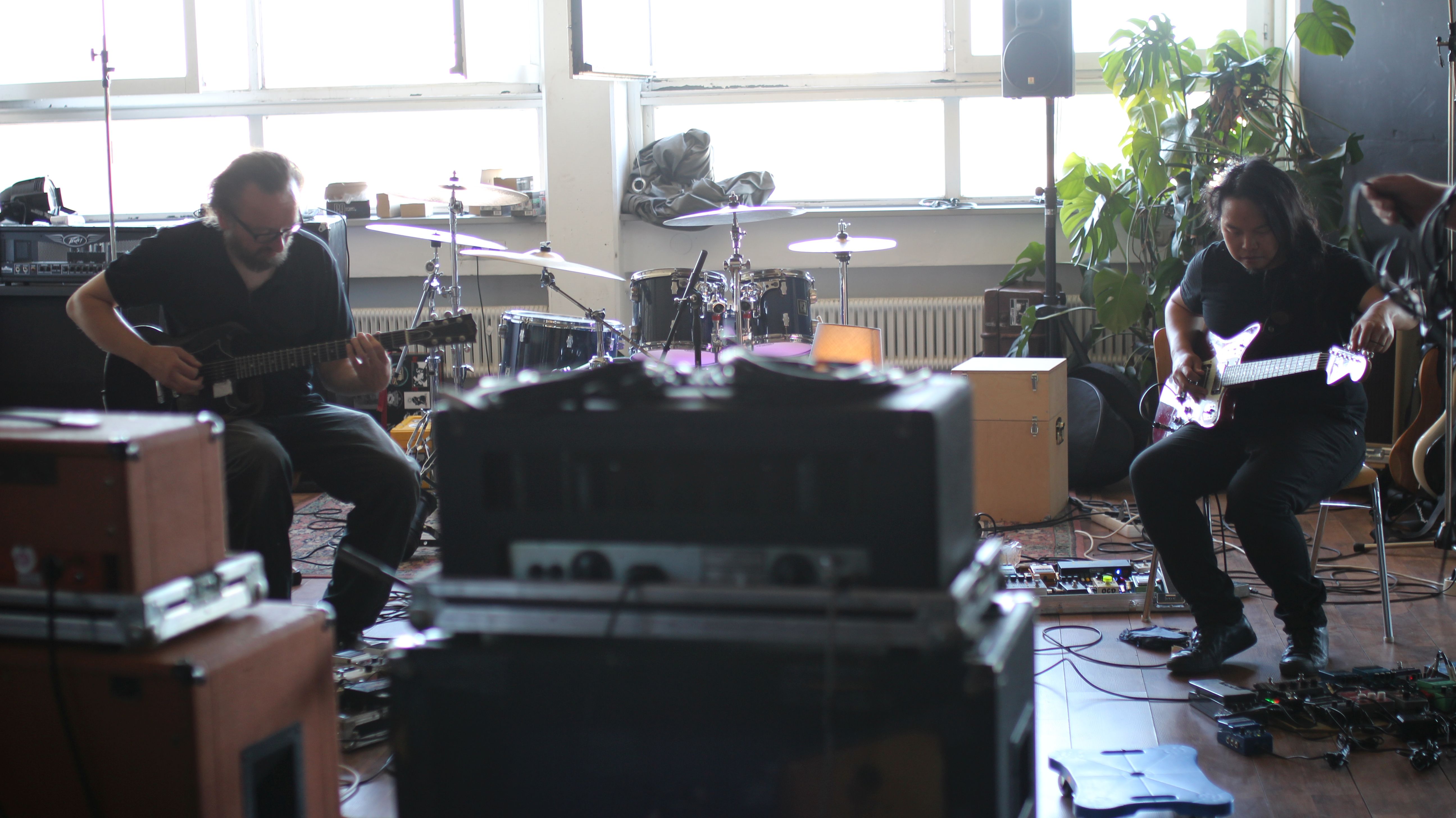
Once a piece is finished, how important is it for you to let it lie and evaluate it later on? How much improvement and refinement do you personally allow until you're satisfied with a piece? What does this process look like in practice?
N: Like I said above, in my case improvement and refinement of an already recorded track is limited to just EQ-work. No cut, nor paste. But to put a recorded track away and listen to it again only after some days or even weeks is of a big importance for me; especially if I am not sure about the track’s quality after recording. After that time, I always know if the recording was a success or not. And if not, I possibly repeat it instead of tweaking it.
Eric: In my solo works, I don't necessarily work a lot on a track after it's recorded. Although when it happens, and I'm not saying it's not often ... It can really be often, in the sense that, sometimes if I do hear the potential in the track that is realistically reachable, I will do everything in my power to be do it and be satisfied, and I can be obsessive with that, at times.
Other times, there isn't much to do - not to say the track is perfect as is, however, it does need to stand the test of time, and sometimes I can listen to a track for two years, every month or every two months, just to make sure it's really worth putting it out there.
I also discard a lot of material without necessarily starting over, I just get over it really quickly and move on to the next idea or improv. In the case of collaborations, if the other one would rather do less than more, I welcome it.
What's your take on the role and importance of production, including mixing and mastering for you personally? How involved do you get in this?
Eric: Tobias sent us a preliminary mix of our recordings, but there were a lot of changes we wanted to do. In the end, and also because we couldn't get together to mix it after the recording sessions, I decided to make my own mixes and send them to Hellmut for feedback. Hellmut would then enhance some things from my mix and send them back to me, and tell me how he got to these results, and then I would input his setting ideas (often EQ, compression, or editing ideas) into my work sessions until we were ultimately both satisfied with the final product.
After finishing a piece or album and releasing something into the world, there can be a sense of emptiness. Can you relate to this – and how do you return to the state of creativity after experiencing it?
Eric: It's a vicious cycle, it's hard to let something linger, unfinished, for months, for years, but sometimes it happens. There is a lot of satisfaction to finally complete a project.
In my case, I think it is also a necessity to close a folder and archive it because I constantly have many projects going on at once ...
Returning to the state of creativity is not a problem, it's constant, and often overflowing, and will probably be so, as long as there is life.
N: I want to complete a project also and always. Only then it is done. And only then I am fine with the whole project. And like it is with Eric: There is always a project; anytime.
Creativity can reach many different corners of our lives. Do you personally feel as though writing a piece of music is inherently different from something like making a great cup of coffee? What do you express through music that you couldn't or wouldn't in more 'mundane' tasks?
Eric: We all have left and right sides of the brain, in different proportions. I personally feel that both sides are working constantly in overtime, and that different tasks need to be switched often to give it a rest from time to time. Sometimes, it's a matter of switching mediums, for example, I feel that cooking is a great way to be creative and I enjoy switching to that task in order to relax and do something practical, while still being creative.
I think even before music and visual arts, when I was little, I would tend to create mechanical inventions with craft and tinkering with little engineering projects - for example, a device to open my bedroom's door without having to get up, or building a tube slide to send messages between the floors of the house. How different is it from making music?
Well, music is essentially a mirror to our insides, it is very subjective. In the case of our collaboration, I think we both project it outwards and the result is the merging of both outputs. How we decide to sculpt it after the fact, is actually a compromise.
N: I would not try to evaluate which possible field of creativity is ‘worth’ more than others. Besides others I am into music and that is fine for me. But I can also give my salute to those who are into completely different things if that what they do is high level …
With our collaboration it is like having a conversation: You talk with each other about the matter and in the end you may find new answers. And you hopefully like those.



